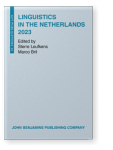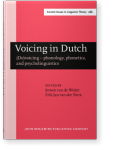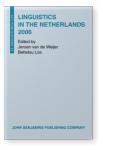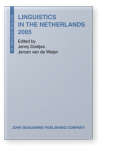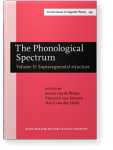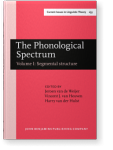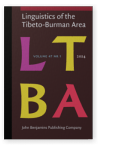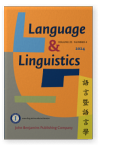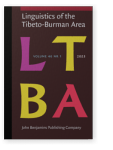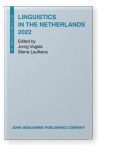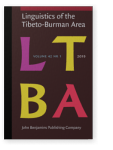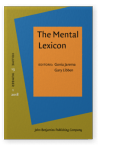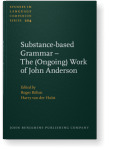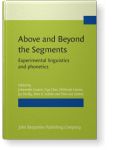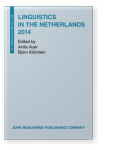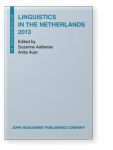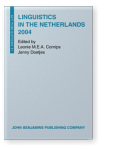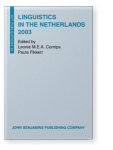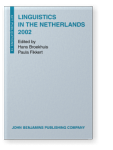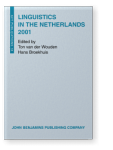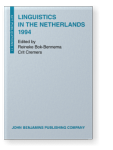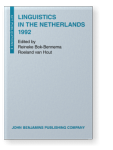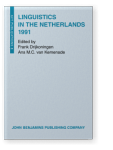Jeroen van de Weijer
List of John Benjamins publications for which Jeroen van de Weijer plays a role.
Yearbook
Voicing in Dutch: (De)voicing – phonology, phonetics, and psycholinguistics
Edited by Jeroen van de Weijer and Erik Jan van der Torre
[Current Issues in Linguistic Theory, 286] 2007. x, 186 pp.
Subjects Germanic linguistics | Phonology | Theoretical linguistics
Linguistics in the Netherlands 2006
Edited by Jeroen van de Weijer and Bettelou Los
[Linguistics in the Netherlands, 23] 2006. viii, 248 pp.
Subjects Theoretical linguistics
Linguistics in the Netherlands 2005
Edited by Jenny Doetjes and Jeroen van de Weijer
[Linguistics in the Netherlands, 22] 2005. viii, 243 pp.
Subjects Theoretical linguistics
The Phonological Spectrum: 2 Volumes (set)
Edited by Jeroen van de Weijer, Vincent J. van Heuven and Harry van der Hulst
[Current Issues in Linguistic Theory, 233-234] 2003. x, 308 pp. & x, 264 pp.
Subjects Phonetics | Phonology
The Phonological Spectrum: Volume II: Suprasegmental structure
Edited by Jeroen van de Weijer, Vincent J. van Heuven and Harry van der Hulst
[Current Issues in Linguistic Theory, 234] 2003. x, 262 pp.
Subjects Phonetics | Phonology
The Phonological Spectrum: Volume I: Segmental structure
Edited by Jeroen van de Weijer, Vincent J. van Heuven and Harry van der Hulst
[Current Issues in Linguistic Theory, 233] 2003. x, 306 pp.
Subjects Phonetics | Phonology
2024 The multiple functions of the reflexive pronoun in Tujia Linguistics of the Tibeto-Burman Area 47:1, pp. 140–159 | Article
This paper investigates the functions of the reflexive pronoun ko
53
to
21/to
21 in Tujia, a Tibeto-Burman (TB) language. Apart from being used as a verb object, the reflexive pronoun in Tujia can be used as an intensifier, indicating “self, non-other”, but it can also be used to… read more
2024 Waning and waxing: The case of comparative marking in Tujia Language and Linguistics 25:4, pp. 644–672 | Article
This paper provides a preliminary description of the comparative construction in Tujia (northern dialect; NT), an endangered ergative Tibeto-Burman (TB) language spoken in China, in the context of the typologically diverse ways in which comparative meaning is expressed. In mono-clauses in NT,… read more
2023 The serial verb construction in Tujia Linguistics of the Tibeto-Burman Area 46:1, pp. 72–94 | Article
This paper presents a comprehensive description of the serial verb construction (henceforth SVC) in Tujia. It shows that serial verbs or verb phrases in Tujia are linked by the particle lie
55. lie
55 does not contribute any semantic content to the construction, but only functions as a… read more
2022 The role of word frequency in the L2 acquisition of variable patterns: A case study of the pronunciation of English words with –man by Chinese learners Linguistics in the Netherlands 2022, Vogels, Jorrig and Sterre Leufkens (eds.), pp. 279–294 | Article
Second language acquisition often involves the acquisition of stable patterns in a target language. Here we investigate how the acquisition of a variable pronunciation pattern, viz. the pronunciation of the semisuffix -man in professional names in English (e.g. policeman, businessman) is related… read more
2019 Nominalization and relativization in Tujia: A crosslinguistic perspective Linguistics of the Tibeto-Burman Area 42:1, pp. 82–109 | Article
This paper presents a preliminary investigation of nominalization and relativization in Tujia from a typological perspective. We show that there are several nominalizers in Tujia, only two of which are multifunctional: ɕi and ɲie. ɕi can function as a nominalizer, a relativizer, a… read more
2018 Calculating a pattern’s competitive strength: Competition between /æ/ and /ʌ/ in irregular simple pasts and past participles in English The Mental Lexicon 13:1, pp. 143–157 | Article
This article proposes a measure of the competitive strength of two rival patterns in the domain of a subgroup of irregular verbs in English. There is competition between simple pasts built on the vowels /æ/ and /ʌ/, and the same competition is found in the domain of past participles. As a result… read more
2018 Degrees of complexity in phonological segments Substance-based Grammar – The (Ongoing) Work of John Anderson, Böhm, Roger and Harry van der Hulst (eds.), pp. 385–430 | Chapter
In this chapter the authors discuss the representation of degrees of complexity in segmental structure. After exploring several measures of complexity in relation to the notion of markedness, five assumptions concerning phonological primes are listed. Adopting a dependency-based model using unary… read more
2014 Affricates in English as a natural class Above and Beyond the Segments: Experimental linguistics and phonetics, Caspers, Johanneke, Yiya Chen, Willemijn Heeren, Jos Pacilly, Niels O. Schiller and Ellen van Zanten (eds.), pp. 350–358 | Article
This paper investigates the role of affricates in the phonotactics of English, and
notes that these segments behave differently from stops and differently from
fricatives. This is taken as evidence against the proposal that affricates cannot
form a natural class by themselves, which is inherent in… read more
2014 The four tones of Mandarin Chinese: Representation and acquisition Linguistics in the Netherlands 2014, Auer, Anita and Björn Köhnlein (eds.), pp. 180–191 | Article
In this paper we discuss the four tones of Standard (Beijing) Mandarin Chinese. First, we will suggest a proposal for their phonological representation. Then, we discuss the order in which they are acquired in first language acquisition, relating this both to the representations we propose and to… read more
2013 Acquiring markedness constraints: The case of French Linguistics in the Netherlands 2013, Aalberse, Suzanne and Anita Auer (eds.), pp. 188–200 | Article
This paper questions the assumption made in classic Optimality Theory (Prince & Smolensky 1993 [2004]) that markedness constraints are an innate part of Universal Grammar. Instead, we argue that constraints are acquired on the basis of the language data to which L1 learning children are exposed.… read more
2004 On segmental complexity: Affricates and patterns of segmental modification in consonant inventories Linguistics in the Netherlands 2004, Cornips, Leonie and Jenny Doetjes (eds.), pp. 217–228 | Article
2003 Nasality, voice and more The Phonological Spectrum: Volume I: Segmental structure, Weijer, Jeroen van de, Vincent J. van Heuven and Harry van der Hulst (eds.), pp. ix–x | Article
2003 Patterns of segmental modification in consonant inventories: Contrastive vs. redundant systems and phonology vs. phonetics Linguistics in the Netherlands 2003, Cornips, Leonie and Paula Fikkert (eds.), pp. 71–81 | Article
2002 An Optimality Theoretical analysis of the Dutch diminutive Linguistics in the Netherlands 2002, Broekhuis, Hans and Paula Fikkert (eds.), pp. 199–209 | Article
2001 On de-affrication in Modern Georgian Linguistics in the Netherlands 2001, Wouden, Ton van der and Hans Broekhuis (eds.), pp. 41–51 | Article
1994 Stem Consonant Cooccurrence Restrictions in Ngbaka Linguistics in the Netherlands 1994, Bok-Bennema, Reineke and Crit Cremers (eds.), pp. 259–266 | Article
1992 On the formal description of palatalisation Linguistics in the Netherlands 1992, Bok-Bennema, Reineke and Roeland van Hout (eds.), pp. 125–135 | Article
1992 The manner node Linguistics in the Netherlands 1992, Bok-Bennema, Reineke and Roeland van Hout (eds.), pp. 261–272 | Article
1991 Towards a Theory of Phonological Complexity Linguistics in the Netherlands 1991, Drijkoningen, Frank and Ans M.C. van Kemenade (eds.), pp. 141–150 | Article
